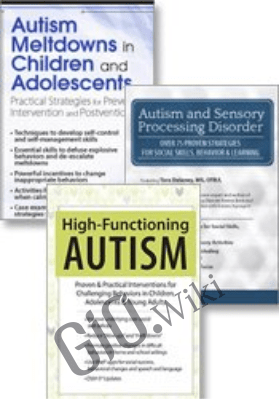Kathy Morris, M.Ed , Tara Delaney, M.S & Heather Dukes-Murray, PhD
About Author
Kathy Morris, M.Ed., B.S., will lead you through dynamic discussion, video case examples and demonstrations providing dozens of strategies you can implement immediately with these children/adolescents—in any setting. Walk away with an array of practical strategies for preventing and de-escalating meltdowns, teaching and promoting appropriate behaviors, providing instructional consequences/replacement behaviors and developing self-control and self-management skills.
“Teach them in the way they learn” will be a mantra throughout this training session.
Author and Making Sense-ory® series founder Tara Delaney, M.S., O.T.R./L, will teach you a new model of development (The Brain Library™) that gives you a way of understanding how the nervous system relies on basic sensory foundations for more complex skills. Early signs of sensory processing difficulties that may be linked to autism will be more recognizable. The latest brain research supports using sensory integration theory as a lens for viewing specific behavioral, learning and social challenges. Take home sensory strategies to aid children with autism for increased success academically and socially. This information is crucial since more than 90% of children with autism are documented as having sensory processing difficulties as well. It is imperative that you get the tools you need to help children with autism work through the sensory-related difficulties since these difficulties may hinder a child from success in other areas.
Licensed Clinical Psychologist Heather Dukes-Murray, PhD, will provide proven intervention strategies, essential treatment tools, and behavioral techniques to help you analyze behaviors and actions, identify consequences for behaviors, and teach new skills to children, adolescents and young adults with high-functioning autism (HFA). Walk away with practical intervention techniques for social success, behavior changes and overcoming challenging co-occurring behaviors that deliver success through adulthood. Don’t just manage individuals with HFA; provide interventions that lead to successful independence!

![© GiO Wiki - Courses [BigData]](/assets/img/user_mobile.png)

